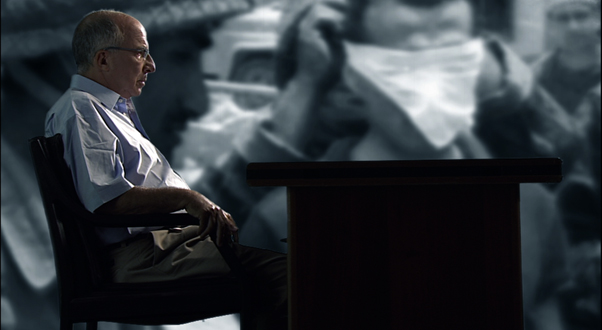
Jonathan Livny, lieutenant colonel (retired), military judge 1976-1999 in THE LAW IN THESE PARTS (Cinema Guild)
Punctuated with pungent visual and narrative footnotes, The Law in These Parts comes close to being the Pentagon Papers of the Israeli occupation of the Palestinian Territories. Director Ra’anan Alexandrowicz incisively narrates a chronological history of Israel’s takeover of the West Bank and Gaza Strip in 1967 and the legal framework for how a democratic country controls more than two million people today who are not its citizens.
After warning that he’ll be wielding the documentary format like a litigator with a case to make, Alexandrowicz places one at a time nine high-ranking men to sit behind a raised judge’s bench for interviews, men who were high-level military prosecutors, judges, and legal advisors to the West Bank Military Command. In a style similar to Errol Morris’s interrogatory documentaries, Alexandrowicz projects archival news footage from Israel’s oldest TV channel behind his mock courtroom to illustrate what was happening to the territories’ residents in each decade of the occupation, to jar the lawyers’ memories, and to sometimes contradict their version of the truth.
Right from the start, the behind-the-scenes insights offer a different interpretation of the conventional history of how Israeli forces did not expect to go beyond the borders set in the 1949 armistice (the so-called “Green Line”), such as was told in ‘Six Days’ June 1967: The War That Changed the Middle East. The military lawyers explain that the high command had already planned for eventual occupation by asking them to prepare in advance a legal code to comply with the international protocols of the Geneva Convention’s protections for civilians and property. So the Israel Defense Forces (IDF) began issuing orders immediately, and the director sums up the result as, “What the IDF says goes.”
Alexandrowicz hones in on the central ethical conundrum of the IDF acting as a civil and military administration of a civilian population, which became more and more complicated over the decades, particularly when Israeli settlers moved into the territories, first in small, ultra-religious groups. The key element to the system’s international credibility—and for the lawyers’ rationalizations—is that the IDF rulings were subject to the Supreme Court of Israel, raising the significance of the interviews with the dignified octogenarian Meir Shamgar, a judge on the Court for two decades and then its president from 1983-1995. Though sometimes the director’s questions about the fairness of specific cases border on badgering an old man with a failing memory, Shamgar remains proud of the (few) court rulings that he found in favor of Palestinian plaintiffs.
So it becomes that much more painful to watch other lawyers describe how they helped the IDF get around those rulings as the numbers of Jewish settlers increased (as did Palestinian attacks within Israel). Alexander Ramati, a legal advisor to Ariel Sharon, then-Agriculture Minister and Jewish settlement promoter, practically chortles when he tells how he told Sharon in 1979 about a mid-19th century Ottoman Empire law of “mawat,” whereby fallow land a rooster’s crow distance from a village belonged to the state. This leads Sharon to start a land rush of appropriating quickly surveyed land to the Israeli government for expanded settlements.
What becomes clear, as the interviews feature younger men who served as lawyers and jurists when the violence escalated from the late 1980s on, is that perceptions hardened, and the non-Jewish residents of the Occupied Territories were no longer seen as civilians but as enemies in a guerrilla war who were not following the Geneva conventions of uniformed armies attacking military targets. So as the judges and prosecutors recall exhausting numbers of cases dragging on, some admit they may have turned a blind eye to signs of torture during interrogations and to other issues, such as lack of translators and defense counsels, though others still firmly believe that this approach was necessary to protect Israelis’ lives.
It isn’t clear to a non-Israeli audience if these military lawyers were career officers who made a choice as to what client they served, or if they couldn’t as reservists, like almost all Israeli men who are called up frequently. That doesn’t excuse, though, those who were unquestioning jurists, but it isn’t a particularly new insight that military justice is to justice what military music is to music, a view ironically attributed variously to Georges Clemenceau, about the anti-Semitic Dreyfus Affair, and to Groucho Marx. But there is nothing funny in this case, only sobering considerations for other democratic countries involved in other conflicts.






Fantastic film, absoulutely no question about it.